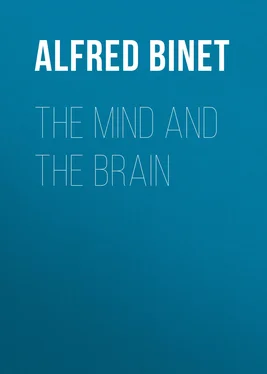Alfred Binet - The Mind and the Brain
Здесь есть возможность читать онлайн «Alfred Binet - The Mind and the Brain» — ознакомительный отрывок электронной книги совершенно бесплатно, а после прочтения отрывка купить полную версию. В некоторых случаях можно слушать аудио, скачать через торрент в формате fb2 и присутствует краткое содержание. Жанр: foreign_prose, foreign_religion, Философия, foreign_psychology, foreign_antique, на английском языке. Описание произведения, (предисловие) а так же отзывы посетителей доступны на портале библиотеки ЛибКат.
- Название:The Mind and the Brain
- Автор:
- Жанр:
- Год:неизвестен
- ISBN:нет данных
- Рейтинг книги:4 / 5. Голосов: 1
-
Избранное:Добавить в избранное
- Отзывы:
-
Ваша оценка:
- 80
- 1
- 2
- 3
- 4
- 5
The Mind and the Brain: краткое содержание, описание и аннотация
Предлагаем к чтению аннотацию, описание, краткое содержание или предисловие (зависит от того, что написал сам автор книги «The Mind and the Brain»). Если вы не нашли необходимую информацию о книге — напишите в комментариях, мы постараемся отыскать её.
The Mind and the Brain — читать онлайн ознакомительный отрывок
Ниже представлен текст книги, разбитый по страницам. Система сохранения места последней прочитанной страницы, позволяет с удобством читать онлайн бесплатно книгу «The Mind and the Brain», без необходимости каждый раз заново искать на чём Вы остановились. Поставьте закладку, и сможете в любой момент перейти на страницу, на которой закончили чтение.
Интервал:
Закладка:
But it is not the notion of movement alone which proceeds from sensation. There is also that of exteriority, of space, of position, and, by opposition, that of external or psychological events. Without declaring it to be certain, I will remind you that it is infinitely probable that these notions are derived from our muscular experience. Free motion, arrested motion, the effort, the speed, and the direction of motion, such are the sensorial elements, which, in all probability, constitute the foundation of our ideas on space and its properties. And those are so many subjective notions which we have no right to treat as objects belonging to the outer world.
What is more remarkable, also, is that even the ideas of object, of body, and of matter, are derived from visual and tactile sensations which have been illegitimately set up as entities. We have come, in fact, to consider matter as a being separate from sensations, superior to our sensations, distinct from the properties which enable us to know it, and binding together these properties, as it were, in a sheaf. Here again is a conception at the base of visualisation and muscularisation; it consists in referring to the visual and other sensations, raised for the occasion to the dignity of external and permanent causes, the other sensations which are considered as the effects of the first named upon our organs of sense.
It demands a great effort to clear our minds of these familiar conceptions which, it is plain are nothing but naïve realism. Yes! the mechanical conception of the universe is nothing but naïve realism.
To recapitulate our idea, and, to make it more plain by an illustration, here is a tuning-fork on the table before me. With a vigorous stroke of the bow I set it vibrating. The two prongs separate, oscillate rapidly, and a sound of a certain tone is heard. I connect this tuning-fork, by means of electric wires, with a Déprez recording apparatus which records the vibrations on the blackened surface of a revolving cylinder; and we can thus, by an examination of the trace made under our eyes, ascertain all the details of the movement which animates it. We see, parallel to each other, two different orders of phenomena; the visual phenomena which show us that the tuning-fork is vibrating, and the auditory phenomena which convey to us the fact that it is making a sound.
The physicist, asked for an explanation of all this, will answer: "It is the vibration of the tuning-fork which, transmitted by the air, is carried to our auditory apparatus, causes a vibration in the tympanum, the movements of which are communicated to the small bones of the middle ear, thence (abridging details) to the terminations of the auditory nerve, and so produces in us the subjective sensation of sound." Well, in so saying, the physicist commits an error of interpretation; outside our ears there exists something we do not know which excites them; this something cannot be the vibratory movement of the tuning-fork, for this vibratory movement which we can see is likewise a subjective sensation; it no more exists outside our sight than sound exists outside our ears. In any case, it is as absurd to explain a sensation of sound by one of sight, as a sensation of sight by one of sound.
One would be neither further from nor nearer to the truth if we answered that physicist as follows: "You give the preponderance to your eye; I myself give it to my ear. This tuning-fork appears to you to vibrate. Wrong! This is how the thing occurs. This tuning-fork produces a sound which, by exciting our retina, gives us a sense of movement. This visual sensation of vibration is a purely subjective one, the external cause of the phenomenon is the sound. The outer world is a concert of sounds which rises in the immensity of space. Matter is noise and nothingness is silence."
This theory of the above experiment is not absurd; but, as a matter of fact, it is probable that no one would or could accept it, except verbally for amusement, as a challenge, or for the pleasure of talking metaphysics. The reason is that all our evolution, for causes which would take too long to detail, has established the hegemony of certain of our senses over the others. We have, above all, become visual and manual beings. It is the eye and the hand which give us the perceptions of the outer world of which we almost exclusively make use in our sciences; and we are now almost incapable of representing to ourselves the foundation of phenomena otherwise than by means of these organs. Thus all the preceding experiment from the stroke of the bow to the final noise presents itself to us in visual terms, and further, these terms are not confined to a series of detached sensations.
Visual sensation combines with the tactile and muscular sensations, and forms sensorial constructions which succeed each, other, continue, and arrange themselves logically: in lieu of sensations, there are objects and relations of space between these objects, and the actions which connect them, and the phenomena which pass from one to the other. All that is only sensation, if you will; but merely as the agglutinated molecules of cement and of stone are a palace.
Thus the whole series of visual events which compose our experiment with the tuning-fork can be coherently explained. One understands that It is the movement of my hand equipped with the bow which is communicated to the tuning-fork. One understands that this movement passing into the fork has changed its form and rhythm, that the waves produced by the fork transmit themselves, by the oscillations of the air-molecules, to our tympanum, and so on. There is in all this series of experiments an admirable continuity which fully satisfies our minds. However much we might be convinced by the theoretical reasons given above, that we have quite as much right to represent the same series of events in an auditory form, we should be incapable of realising that form to ourselves.
What would be the structure of the ear to any one who only knew it through the sense of hearing? What would become of the tympanum, the small bones, the cochlea, and the terminations of the acoustic nerve, if it were only permitted to represent them in the language of sound? It is very difficult to imagine.
Since, however, we are theorising, let us not be stopped by a few difficulties of comprehension. Perhaps a little training might enable us to overcome them. Perhaps musicians, who discern as much reality in what one hears as in what one sees, would be more apt than other folk to understand the necessary transposition. Some of them, in their autobiographies, have made, by the way, very suggestive remarks on the importance they attribute to sound: and, moreover, the musical world, with its notes, its intervals, and its orchestration, lives and develops in a manner totally independent of vibration.
Perhaps we can here quote one or two examples which may give us a lead. To measure the length of a body instead of applying to it a yard-wand, one might listen to its sound; for the pitch of the sound given by two cords allows us to deduce their difference of length, and even the absolute length of each. The chemical composition of a body might be noted by its electric resistance and the latter verified by the telephone; that is to say, by the ear. Or, to take a more subtle example. We might make calculations with sounds of which we have studied the harmonic relations as we do nowadays with figures. A sum in rule of three might even be solved sonorously; for, given three sounds, the ear can find a fourth which should have the same relation to the third as the second to the first. Every musical ear performs this operation easily; now, this fourth sound, what else is it but the fourth term in a rule of three? And by taking into consideration the number of its vibrations a numerical solution would be found to the problem. This novel form of calculating machine might serve to fix the price of woollen stuffs, to calculate brokerages and percentages, and the solution would be obtained without the aid of figures, without calculation, without visualisation, and by the ear alone.
Читать дальшеИнтервал:
Закладка:
Похожие книги на «The Mind and the Brain»
Представляем Вашему вниманию похожие книги на «The Mind and the Brain» списком для выбора. Мы отобрали схожую по названию и смыслу литературу в надежде предоставить читателям больше вариантов отыскать новые, интересные, ещё непрочитанные произведения.
Обсуждение, отзывы о книге «The Mind and the Brain» и просто собственные мнения читателей. Оставьте ваши комментарии, напишите, что Вы думаете о произведении, его смысле или главных героях. Укажите что конкретно понравилось, а что нет, и почему Вы так считаете.












